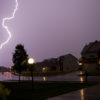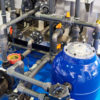If pool owners have one universal complaint, it is that they wish they had a longer season to enjoy the perks of their outdoor swimming pool. Increase the time you spend in your pool with the use of a heat pump. Keep your pool clean and running efficiently during the winter months, too; talk to Pool Troopers for more information or to schedule service, year-round.
When it comes to warming the water that you want to swim in, here are some things to know about pool heat pumps:
Heat Pumps
Heat pumps offer several benefits to pools and pool owners. In mild climates, a heat pump can be a cost-effective way to heat your pool and enjoy it for far longer. The process of heating a pool with a pump rather than a gas heater involves passing air over an evaporator coil, before returning the heated water back into the pool without the need for natural gas or propane. Keep in mind that heat pumps are not effective in temperatures under 50- degrees Fahrenheit, as the system relies on ambient warmth to effectively heat the water. For this reason, you may find that a back-up heat source is needed or that there are months when it is simply not practical to expect a swim in a warm pool.
Heaters
If the temperature gets below 50- degrees Fahrenheit, you may want to consider a heater for your pool. It is easy to find pool heaters at pool supply stores. Heaters are cheaper to install than a heat pump, but keep in mind that they require gas to operate. Generally, these types of heaters heat your water as the circulation system pushes the water through coils above a flame burner, before returning it to the pool. Some advantages of pool heaters include that they heat quickly, though they cost a lot in energy to operate in cooler weather. The two main types of heaters that buyers can choose from are:
- Gas-powered heaters include propane heaters and natural gas heaters. The accessibility to natural gas will determine which one you should get.
- Electric heaters that are not heat pumps are designed for small bodies of water like bathtubs and small spas. They are not an option for open swimming pools as they are not designed to heat that much water. They work with electric heat strips like the emergency heat on your air conditioner and would be very inefficient and cost-prohibitive on a full-sized pool. If gas is not an option for you, go with a heat pump to heat your pool.
Depending on where you live, the best choice can improve and extend your overall swim experience.
The Environment
When it comes to the environment, heat pumps are more eco-friendly; heat pumps don’t burn gas or use fuel at the unit (fuel is used to create the electricity), so they produce zero CO2 emissions. Using minimal electricity, heat pumps pull the heat that they need from the surrounding air, so they are a better fit for pool owners that want to be green. Natural Gas and propane heaters do burn at the unit and therefore emit exhaust from the combustion of the gas. Heat pumps, therefore, may have a lower impact on the environment depending upon how your electricity is created.
Convenience
Both pumps and heaters are convenient to use, making a warm dip in the pool possible in most climates, but remember that since heat pumps rely on the warm surrounding air, they are ineffective in temperatures below 50 degrees F. However, if the goal is to begin early and extend the pool season in the sunbelt of the USA, a heat pump may be the ideal solution as it is perfectly suited for that job.
Gas heaters are much faster at heating water so are the smart choice for small bodies of water like spas. That is why they are the heater of choice for spas and hot tubs.
Longevity
For longevity, look no further than a heat pump for your pool. These units last and last. Heat pumps are widely lauded for being one of the most durable products around and a solid choice for many climates. A quality heat pump should last from 10-12 years, maybe longer! By contrast, most gas heaters will require replacement within 8-10 years. All units’ lives are shortened when they are on the coasts exposed to saltwater conditions.
It makes sense to talk to an industry expert about pool heat pumps before making the switch. Contact the pool professionals to learn more or schedule an appointment for service.
Maintenance
Remember to take care of general pool maintenance in order to preserve and protect your property, regardless of whether you use a heat pump or gas pool heater. From having the deck pressure washed to addressing drainage issues promptly, taking good care of your pool ensures that it performs better in all kinds of weather and temperatures, with fewer repair and utility costs. Pool professionals agree that maintaining your pool and having it professionally serviced can extend its life, and reduce health risks associated with swimming pools, like algae or mildew, while also providing an opportunity to evaluate the pool and its parts before any issues emerge.
Still have questions about heat pumps? Rely on a pool professional in your area to help you figure out the best route to take when it comes to extending the use and enjoyment of your pool. Reassess how you heat the water in your swimming pool and consider heat pumps to extend the time, season, and life of your pool, which makes it a more prudent property investment, overall.
Got questions or concerns about maintaining your swimming pool? Reach out to the professionals for help. A pool is an important feature on any property; take care of it and look for ways to keep maintenance simple. Pool Troopers is the go-to professional for the provision of chemical, cleaning, and repair services, and take pride in quality work and customer satisfaction; their aim is for you to enjoy your pool. Consumers have entrusted the qualified team of experienced technicians at Pool Troopers with their pools since 1952; they look forward to earning your loyal patronage and trust, too. Spend your pool time swimming and lounging, not cleaning or fixing; call Pool Troopers today.



